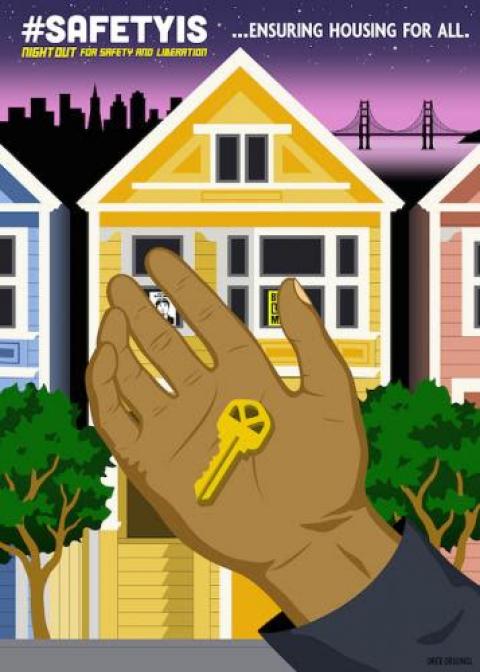Too often, when we think about safety, we think about crime and fear. But beyond an absence of violence, what else do we need to feel safe in our communities?
Philando Castile, Alton Sterling, and the 589 other people killed at the hands of police this year weren’t safe. They weren’t safe because they lived in a country where the government divested resources from their communities for decades while sending in cops to surveil, criminalize, and incarcerate them.
Eric Garner wasn’t safe because he lived in a country that criminalizes poverty. Mike Brown wasn’t safe because Black lives are so devalued that his body could be left in the street for more than four hours. Sandra Bland wasn’t safe because, in this country, how much money you have determines how long you sit in a jail cell, or if you make it out alive.
It’s time to redefine and reclaim what #SafetyIs for ourselves.
Safety is being able to survive a traffic stop without being harmed; safety is also not being pulled over on account of your skin color in the first place.
Safety is being able to sell CDs in a parking lot without being killed by police. But safety is also not needing to sell those CDs at all, because there are job opportunities that allow us to provide for our families; secure jobs that pay a living wage and are free of workplace violence, sexual harassment, and discrimination.
Without economic opportunities in communities, or when they are subjected to harassment or violence in the workplace, people will naturally try to survive however they can. And then, when people find ways to scrape together a living, even that behavior is criminalized. It is not a coincidence that the most over policed communities are also the most under resourced. And when people come home from prison and can’t find a job, the cycle of poverty continues.
This year, more than ever, we know that safety won’t come from more police or better relationships with police. We will be safe when we divest from punishment and invest in communities.
Every year, on the first Tuesday of August, the National Association of Neighborhood Watch hosts National Night Out, an event that emphasizes community-police partnerships as the pathway to safety. On August 2nd, join us for Night Out for Safety and Liberation (NOSL), a national event where we redefine safety for ourselves.
Organizations across the country are hosting NOSL events — block parties, community forums, teach-ins, and rallies — where people will come together to build community and support each other.
Together, we will build safe communities where people have homes without fear of displacement. Where they have healthcare that they can afford. Where a quality education is accessible for all. Where people have access to clean water and healthy food.
Together, we will build safe communities where public resources are reinvested from a wasteful criminal legal system to long term solutions.
In Oakland, we are building our vision of community safety by creating Restore Oakland — a space where people of color, people from low-income communities, and those directly impacted by incarceration can find what they need to thrive.
Restore Oakland, a collaboration between the Ella Baker Center and Restaurant Opportunities Centers United, will be a space that connects community organizing, restorative justice, and economic opportunity.
These programs will reduce cycles of violence by allowing victims to feel heard and supported, and by preventing people from being ensnared in the criminal justice system. ROC United’s COLORS Restaurant–a fine-dining restaurant, worker training-facility, and worker-owned cooperative incubator in one — will advance people of color within the highly segregated restaurant industry and launch more businesses owned by people of color.
At a time when black and brown people are being rapidly displaced from the Bay Area, Restore Oakland creates safety by giving people the skills and opportunities to build resilience and prosperity in their communities.
Together, we will build what we need to be safe, and win the reinvestment our communities need.
This year, find a Night Out for Safety and Liberation event near you on August 2nd, participate on social media, or go to your neighborhood’s National Night Out event and change the conversation that is happening in your community.
Saru Jayaraman is the Co-Founder and Co-Director of Restaurant Opportunities Centers United. Follow her on Twitter: Saru Jayaraman.
Zachary Norris is the Executive Director of the Ella Baker Center for Human Rights. Follow him on Twitter: @ZachWNorris.


Spread the word